President Nasheed of Maldives and his cabinet held the first everunderwater cabinet meeting on Oct. 28. The spectacle was intended todraw attention to the issue that plagues the archipelago — climatechange. Outfitted in scuba suits and surrounded by fish, the Maldiviangovernment focused on the U.N.’s Climate Change Conference inCopenhagen in December.
South Asia Archive
Free Newsletter
A few weeks back, I considered running an experiment here on the blog, where for a certain period of time, I would actually defend positions that were the opposite of my own. The idea was to challenge my own assumptions by adopting the point of view of haduJ — the anti-Judah that exists in some alternate reversed-pole universe. I increasingly wish I could say that my endorsement of an Afghanistan troop surge, even with all the caveats I put on the idea, is part of that experiment. But I wouldn’t do that sort of thing without announcing it first, and […]
As I mentioned to Hampton, only half-jokingly, it looks like I picked a bad week to come out in favor of an Afghanistan surge. Make that a really bad week. Seriously, I’m very conflicted about the way forward, and I think that comes through pretty clearly in this Bloggingheads segment I did with Michael Cohen. (The entire episode can be seen here.) We taped this early last week, before I’d read Tony Corn’s Small Wars Journal article (.pdf) that nudged my thinking past the tipping point. It’s easy to reduce my argument regarding the importance of political signaling to being […]
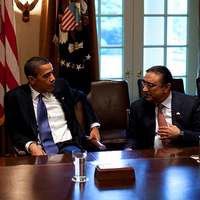
As part of the recently signed Kerry-Lugar Bill authorizing $7.5 billion in economic assistance for Pakistan over the next five years, the U.S. Agency for International Development and the U.S. State Department will be expected to “assist efforts to enhance civilian control and stable constitutional government” in Pakistan, as outlined in the draft metrics for evaluating progress in Pakistan presented by the Obama administration to Congress in September. The goal is to enhance Pakistan’s local capacity for sustainable communal and economic growth so that counterinsurgency (COIN) efforts can be successful. Rebuilding civil society will be even more important as a […]
Just to follow up on what I wrote yesterday, I realize that endorsing a time-bounded but significant troop increase represents something of a reversal, in that I’ve argued consistently for drawing down the U.S military footprint in Afghanistan. So I feel like I owe an explanation, even if some of my ambivalence has come through in my previous posts. Part of the reason for the shift is because, while I’m still very skeptical that we’ll be able to achieve even our minimal objectives in Afghanistan, I’m no longer convinced that they’re impossible. That comes from reading the arguments of a […]
If you’re having trouble keeping the Afghanistan war debate straight, I can’t recommend highly enough Tony Corn’s article in Small Wars Journal (.pdf), titled, “Toward a Kilcullen-Biden Plan? Bounding Counterinsurgency in Afghanistan.” Corn essentially argues that the problem with Gen. Stanley McChrystal’s strategic review is that it pays lip service to the importance of the political dimension of counterinsurgency without truly following it through to its logical conclusions, and that the troop increase he requested is presented as an open-ended commitment. Instead, according to Corn, the troop increase should be bounded in time, put in the context of Vice President […]
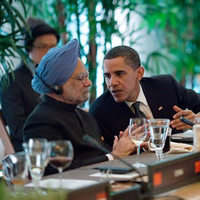
NEW DELHI — The controversy caused in Islamabad by the Kerry-Lugar Bill, which authorizes an annual grant of $1.5 billion to Pakistan for military and non-military purposes over the next five years, is by now well-known. But because of its implications for the entire South Asian region, the bill has also been greeted with alarm in India. The bill’s explicit goal, as stated by the U.S., is to shore up Pakistan’s civilian government under President Asif Ali Zardari by providing monetary assistance to build roads, schools and other infrastructure. The implicit hope is that this will turn widespread Pakistani antipathy […]
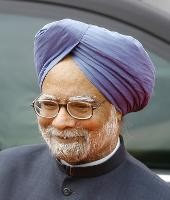
NEW DELHI — India has long seen a reconstruction role for itself in Afghanistan, despite its lack of direct military involvement in the country. Its interests there are obvious: A strong Kabul that keeps the Taliban — and by extension al-Qaida — in check also ensures that jihadi forces in Pakistan do not use Afghanistan as a backyard assembly line for militants who can then be turned against India, and the rest of the world. But New Delhi is not finding its Afghan sojourn easy. Earlier this month, the Indian embassy in Kabul was attacked for the second time in […]
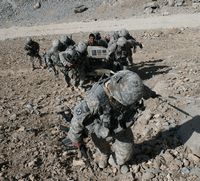
LOGAR PROVINCE, Afghanistan — The observation post near Route Georgia — the U.S. military’s codename for one of the roads running through this eastern province — had a power problem. In the rugged, breadbasket district of Baraki Barak, 50 miles south of Kabul, there are just a few hundred* American soldiers and a similar number of Afghan security forces to provide security for tens of thousands of farmers and their families. To keep watch over the district between foot and vehicle patrols, the U.S. Army’s 3rd Squadron, 71st Cavalry built observation posts atop mountain “spurs” — ridges, essentially — and […]
A lot of the debate over the way forward in Afghanistan revolves around how central safe havens are to the ability of transnational terrorist networks to target the U.S. and the West. Simply put, if you believe, as the Obama administration has stated it does, that the principal mission in Afghanistan is to eliminate the threat posed by al-Qaida, the question becomes, To what extent does that mission depend on denying the group the use of territory? Only after you’ve established your position on safe havens does the question arise of whether creating a stable Afghan state is the best […]
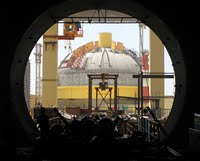
Following the Nuclear Supplier Group’s waiver in September 2008, India seems ready to take its place in the world of nuclear trade — not just as a purchaser, but as a supplier, too. It appears that Kazakhstan is in line to be India’s first customer for indigenously developed 220 megawatt electric (MWe) Pressurized Heavy Water Reactors (PHWRs). The proposed sale seems likely to follow the civil nuclear agreement signed by the two countries in January 2009. In addition to Kazakhstan, a number of Southeast Asian and African countries are also in serious talks with the Indian state-owned nuclear industry major, […]
Interviewed on C-SPAN’s Washington Journal, U.S. Sen. Jim Webb defendsPresident Obama’s deliberate approach to determining the direction ofU.S. strategy in Afghanistan. Webb says the war in Afghanistan cannotbe appropriately analogized to Iraq. Even if it could, Webb believesthat the lessons of Iraq don’t necessarily make the case for a surge oftroops in Afghanistan for a full-blown counterinsurgency. Clip 1 Clip 2
BAGRAM, Afghanistan — Nearly a week after Taliban fighters overran a U.S. and Afghan military outpost in eastern Afghanistan, killing eight Americans and at least two Afghan soldiers, details are finally emerging about the bloody battle. But one U.S. Air Force official wonders why the air service hasn’t highlighted its own vital contributions to it. The battle in the Kamdesh district of Nuristan province pitted hundreds of Taliban fighters against several platoons of American and Afghan troops in an isolated outpost. A platoon typically numbers 40 people. In hours of heavy fighting, the Taliban managed to penetrate the outpost’s walls […]
The debate over the Afghanistan War is now swirling around in a few different directions, with the primary focus in recent weeks being on short-term options and the Obama administration’s process for policy development and implementation. That’s understandable, given, on the one hand, the urgency of the situation on the ground — as reported by Gen. Stanley McChrystal in his strategic review, and independently by the analysts who advised him in the preparation of that document — and on the other, the Obama administration’s “sticker shock” when presented with the resources needed to wage its stated strategy of a counterinsurgency […]
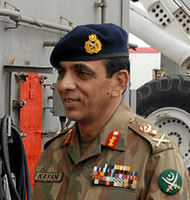
The Enhanced Partnership with Pakistan Act of 2009, generally known as the Kerry-Lugar bill, which President Barack Obama is expected to sign off on soon, has deeply upset the top military leadership in Pakistan, including Army Chief of Staff Gen. Ashfaq Kiyani. In a most atypical fashion, the top brass publicly aired its anger after a meeting of the country’s 12 corps commanders on Wednesday, issuing a public statement denouncing the bill, and urging the Pakistani government to build a national response to it in parliament. Given the stringent conditions attached to the bill, Washington policymakers should perhaps not be […]
As reported by Rajiv Chandrasekaran, the Afghanistan War strategic review officially spirals into “crash and burn” mode. For all of its mindboggling revelations, one graf from the article leaped out at me: Less than three weeks after Obama took office, the White House selectedformer CIA officer Bruce Riedel to review U.S. policy towardAfghanistan and Pakistan. Riedel was told to consult broadly but actquickly: The president wanted his conclusions by mid-March, before aNATO summit in Europe early in April. (Emphasis added.) Of course, that was the combination “first date/honeymoon” summit where President Barack Obama expected to use his post-election political capital […]
